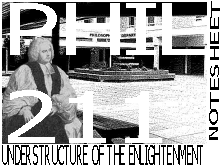 Descartes
1
Descartes
1  Descartes
1
Descartes
1 'Some years ago I was struck by the large number of falsehoods that I had accepted as true in my childhood, and by the highly doubtful nature of the whole edifice that I had subsequently based on them. I realized that it was necessary, once in the course of my life, to demolish everything completely and start again right from the foundations ... ' First Meditation, Cottingham edition, p.17.
Descartes' proposal, rational and yet hopelessly unrealistic from the modern perspective, was that we ought only to believe those things we had thought about and had good reason to believe.
Should we reject beliefs based directly on sense?
Example: 'that I am here, sitting by the fire, wearing a winter dressing-gown, holding this piece of paper in my hands, and so on.' First Meditation, C. p.76,7.
Footnote: Martin Jay's Downcast Eyes (Berkeley, 1993, California Press)
Footnote: G.E. Moore's proof of the external world:
'I can prove now that two human hands exist. How? By holding up the two hands, and saying, as I make a certain gesture with the right hand, 'Here is one hand', and adding, as I make a certain gesture with the left hand 'and her is the other.' G.E.Moore, 'A Proof of an external world', Philosophical Papers, Macmillan, New York, 1962.
Should we think that beliefs based directly on sense are to be retained?
No, says Descartes.
1. Insane persons are mistaken about what their senses tell them.
They firmly maintain e.g.
' that they are kings when they are paupers,
or say that they are dressed in purple when they are naked, or that their heads
are made of earthenware,
or that they are pumpkins,
or made of glass.' First Meditation, C., p.77.
2. Dreams can give us false beliefs, though dreams are made up of components
that are real enough:
' For even when painters try to create sirens or satyrs with the most extraordinary
bodies, they simply jumble up the limbs of different animals. Or if perhaps
they manage to think up something so new that nothing remotely similar has ever
been seen before - something which is therefore completely fictitious and unreal
- at least the colours used in this composition must be real. By similar reasoning,
although these general kinds of things - eyes, head, hands and so on - could
be imaginary, it must at least be admitted that certain other even simpler and
more universal things are real. These are as it were the real colours from which
we form all the images of things, whether true or false, that occur in our thought.
This class appears to include corporeal nature in general, and its extension; the shape of extended things; the quantity, or size and number of these things; the place in which they exist, the time through which they may endure, and so on.' First Meditation, C.
Descartes appears to be saying that although dreaming undermines the certainty with which we can hold certain beliefs, there are others that it does nothing to undermine.
1. 'corporeal nature in general'
2. laws of geometry and arithmetic:
'For whether I am awake or asleep, two and three added together are five, and
a square has no more than four sides.' First Meditation, C., p.78.
3. Even mathematical propositions, he says, are subject to doubt:
1. 'One reason is that people have made mistakes in reasoning in such matters, and have held as certain and self-evident what we see to be false.'
2. 'A more important reason is that we have been told that God who created us can do all that he desires, and we do not yet know whether he may not have willed to create us in such a way that we shall always be deceived even in the things that we think ourselves to know best. (The Principles of Philosophy, Part I, Section 5, Cottingham p.161.)
'I will suppose ... that ... some malicious demon of the utmost power and cunning has employed all his [sic] energies in order to deceive me. I shall think that the sky, the earth, colours, shapes, sounds and all external things are merely the delusions of dreams which he has devised to ensnare my judgement.'
VP